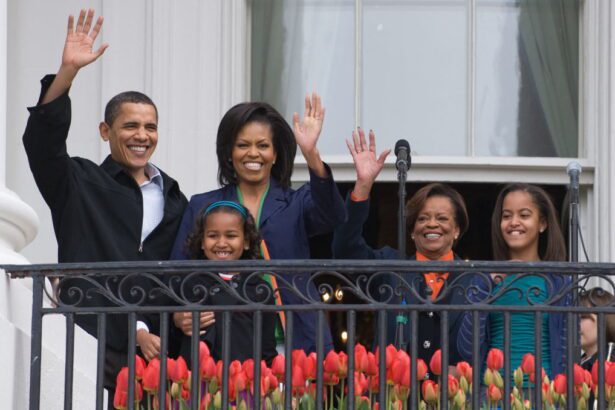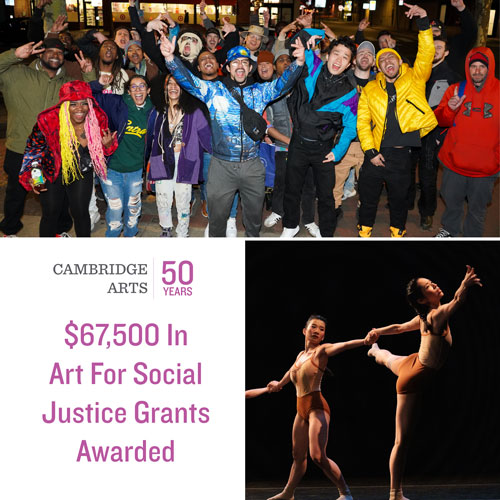4/8/2024 • 5 months ago
Pictured from top: Cambridge Hip-Hop Collective and Asian American Ballet Project.
Winners of Cambridge Arts’ 2024 Art for Social Justice Grants include a program that will have teens research enslaved Africans buried in Cambridge cemeteries and create offerings to be left at the graves; theater performances designed to remove barriers to Black attendance; an Asian American ballet company; steel pan music performed in Cambridge parks; live hip-hop performances; a celebration of jazz history; and support for BIPOC (Black, Indigenous, and other people of color) dance artists.
These are among the nine projects that have been awarded Art for Social Justice Grants totaling $67,500 by Cambridge Arts and the City of Cambridge in 2024. See full list of grants below. This is the third year of the funding program—grants are $7,500 each—which supports projects that present the themes and ongoing work of social justice to the Cambridge public through the arts.
Overall, Cambridge Arts and the City are distributing grants totaling $260,961 to 53 artists and cultural organizations this year through three funding opportunities that Cambridge Arts offered last fall—including Art for Social Justice Grants, Local Cultural Council Grants, and Organizational Investment Grants.
Each year, the City of Cambridge contributes substantial funding to support local artists, cultural workers, and arts organizations through the Cambridge Arts Grant Program. This support is coupled with funding received through the Massachusetts Cultural Council’s statewide Local Cultural Council Program. All these grants are awarded on an annual cycle, with the due date to apply usually in mid-October of each year.
ART FOR SOCIAL JUSTICE GRANTS
Asian American Ballet Project
Grant Award: $7,500.00
Asian American Ballet Project (AABP) uses ballet as a medium to increase the representation of Asian Americans in the arts/entertainment industry. We believe it is critical to the development of young people, that they see themselves represented in a wide variety of areas, including ballet. We aim to become role models in our community and inspire young people to dream big. Our first concert left a strong impression on our audience members; the existence of a ballet company made up entirely of Asian American dancers is important and meaningful. We want to continue to share this message with a larger audience.
AABP brings something different to the local arts scene, instead of overlooking the race of our dancers, our ballets acknowledge our actual, self-identified racial identities, long ignored or stereotyped in classical ballet. AABP performs ballets that have never been performed solely by Asian Americans. We rework traditional favorites in ways that help us connect to the stories and share our retellings in an authentic way. AABP also showcases the work of up-and-coming AAPI choreographers who have the unique opportunity of setting their ballets on all-Asian American casts.
Cambridge Carnival International
Grant Award: $7,500.00
Pan in the Park is a series of traditional steel pan performances in various parks across the City of Cambridge presented by Cambridge Carnival International. This series of events will be one of the highlights of Cambridge Carnival International’s 30th Anniversary City-wide celebration. Each event will showcase the organizations Cambridge Youth Steel Orchestra (CYSO) and the folkloric tradition of steel pan music. This series will kick off in June 2024, and culminate in August 2024.
Cambridge Carnival International is a nonprofit grassroots organization led by a diverse and committed board and Carnival Committee and supported by volunteers. Our signature program, the annual Cambridge Carnival festival, is a colorful and festive celebration that is rooted in African traditions. Carnival secretly allowed public communication and cultural bonding for the Afro-Caribbean cultures from as far back as the 1600s. In 2024 we will celebrate 30 years of bringing a fun, engaging, and culturally diverse event to the City of Cambridge. The festival is a Cambridge institution and attracts thousands of residents and visitors. The highlight of the festival is a grand costume parade accompanied by rich rhythmic musicality promoting all types of cultures that can be seen as revelers masquerade through the streets of Cambridge in dazzling handmade costumes, dancing to the beat of Carnival.
Cambridge Hip-Hop Collective
Grant Award: $7,500
The Bridgeside Cypher is a live hip-hop experience for local rappers, singers, and musicians to collaborate in a public, improvised format. We define a cypher as a gathering of rappers, singers, beatboxers, and/or musicians taking turns freestyling and performing in a circle. What started as an informal gathering of street performers in Graffiti Alley has since transformed into a concert series with featured performances and live instrumentation.
We welcome artists from all backgrounds, ages, and experience levels to join us in creating a supportive and inclusive environment where they can build confidence without worrying about being judged or criticized by the public. Our cypher is open to all and has grown into a diverse gathering of creatives, performers, and spectators from many different backgrounds, ethnicities, social classes, ages, genders, and skill levels to collaborate in unity.
Cambridge Jazz Foundation
Grant Award: $7,500.00
“Harmony in Struggle: Jazz Musicians and the Rhythm of Social Justice” In the heart of Cambridge, as the sun shines over Danehy Park, the 9th annual 2024 Cambridge Jazz Festival comes to life. This year, the festival takes a special focus on the intertwining stories of jazz musicians who not only played mesmerizing melodies but also championed the cause of social justice. Here, we present seven extraordinary jazz musicians, each with their unique tales of using their music as a powerful tool for change. Louis Armstrong – The Ambassador of Swing, Billie Holiday – The Songbird of Protest, John Coltrane – The Spiritual Seeker, Nina Simone – The High Priestess of Soul, Max Roach – The Drummer of Protest, Abbey Lincoln – The Voice of Empowerment, Charles Mingus – The Maverick of Melody. As the 2024 Cambridge Jazz Festival celebrates these legendary jazz musicians and share that their music was not just a soundtrack to the times; it was a catalyst for social change. Their melodies were harmonies of hope, and their rhythms echoed the struggle for justice. In their memory, CJF will continue the legacy of using music to amplify the voices of the oppressed and to inspire a world where all can find their own place in the jazz of life. This will start a dialog with the diverse festival participants. These conversations will be videotaped and exist on our online jazz museum to be viewed by hundreds of thousands!
Kristen Joy Emack
Grant Award: $7,500.00
What does it mean to exist in the shadow of an innovation economy? To live in one of the oldest intellectual capitals of the world, see opportunity around every corner, but know that it remains just out of reach?
Cambridge, Massachusetts, is now one of the top 25 innovation cities in the country and is known for incubating global tech companies and developing life-saving vaccines. While lower-income and working-class families have always struggled here, this tech-driven gentrification model is particularly invasive. It prioritizes wealth building for the financially secure and doesn’t consider or incentivize equity. This documentary project is my response to watching the demographics of my city neighborhoods change, and seeing familiar and loved community spaces redefined by, and for, the benefit of the wealthy. Instead of investing in opportunity for all, replacement, displacement, and cultural harm is the norm, as the existing digital, educational, and access gaps widen.
A saint in its simplest definition, is an ordinary person who lives a courageous life, and because of this, is worthy of imitation. My project, “Book of Saints,” is my way to venerate those most affected by these societal gaps, neighbors, family, friends, activists, artists, wordsmiths, musicians, city employees, students, the undocumented, and others, by making a visual archive of their portraits, and their disappearing, everyday landscapes. They, like my own family, are most impacted by the overlooked consequences of an innovation economy. Yet, they continue to create, hustle, love, learn, and thrive in spite of it.
The Flavor Continues
Grant Award: $7,500.00
The Flavor Continues actively works to uphold spacial, health, and cultural justice through the multi-pronged approach of the Community Space Program. To participate in Street and Club Dance is to actively fight against the segregation and systemic oppression in the US that inevitably placed this Culture in the marginalized category. In reclaiming space and history through the establishment of a physical home, TFC utilizes this art form to form community and belonging as a means for spatial equity, social justice, and cultural justice.
TFC uses dance as a tool to foster mental, emotional, and physical wellbeing, specifically caters to the Street and Club Dance communities, something that no other organization in the state does; the organizational leaders are members of the community, and as such, have an authentic perspective on how to best serve the community.
TFC uses a peer-to-peer learning model, rather than a traditional instructor/student model, to build community, technical skills, and foster a sense of belonging.
The Front Porch Arts Collective (The Porch)
Grant Award: $7,500.00
The Porch has been a leader producing and facilitating BlackOut performances in the Greater Boston area. BlackOuts are designated select performances for exclusively Black audiences within a standard run of a production that depicts the Black experience. Featured in WBUR, The New York Times, and BBC America, BlackOut shows remove common barriers Black audiences experience in predominantly white theaters. The Porch has facilitated BlackOuts in area theaters including SpeakEasy Stage, The Huntington, and Central Square Theater. BlackOut performances require an expanded marketing and promotion strategy beyond the standard production marketing plan. BlackOut performances are designed to provide deeply subsidized ticketing and pay what you want admission models. Thoughtful staffing prioritizing black and brown front-of-house and support staff and companion programming like post-performance discussion and a pre-show reception are also curated to ensure that the entire experience is elevated, joyful, and above all creates a welcoming, exclusive, and safe space.
Midday Movement Series
Grant Award: $7,500.00
“Shades of Movement” (working title), is a program holistically supporting BIPOC dance artists individually and communally with offerings that include individual consultations, social events, and professional development workshops that are open and free of charge for local dance artists of color.
Growing from our work on our Decentering Whiteness in Contemporary Dance Pedagogy workshops, our BIPOC Professional Dancer Mentorship Program, and the mentorship and professional development coaching we have provided to our dedicated teachers since our inception, “Shades of Movement” aims to support BIPOC artists –individually and collectively– as a key method toward racial justice: whereas equity seeks to reform our system, justice aims to transform our culture.
Fatima Seck
Grant Award: $7,500.00
This project will lead a group of Cambridge teens through the act of doing archival and site-based research about the presence of enslaved Africans in Cambridge cemeteries; creating ceramic poem-jugs & ceramic flower arrangements to leave as offerings at tombstones of Africans buried in the Old Burial Grounds & Mt Auburn Cemetery; and putting on a community event to acknowledge Cambridge slave history.
Over the course of the 5-6 workshops, five teens will have the opportunity to explore the histories of slavery that shape Cambridge; craft techniques from coil-method ceramics in African & African American traditions to Edgefield poem-jugs to poetry making with found text; the politics of history, memory & public space; and our responsibility to history and the dead. We’ll learn and develop new skills, engage with marginalized histories, and consider seriously how to practice our responsibility to the dead — particularly those who were marginalized in their lives — with care & compassion.



